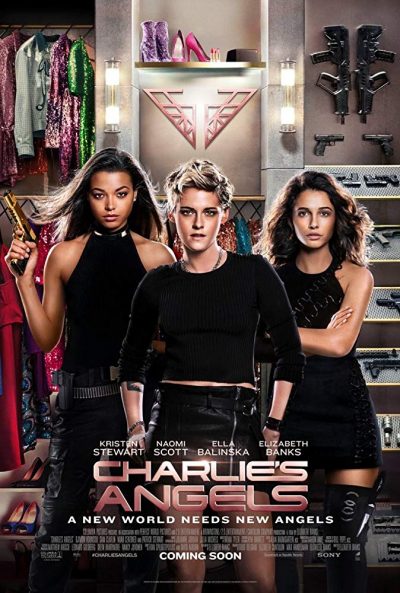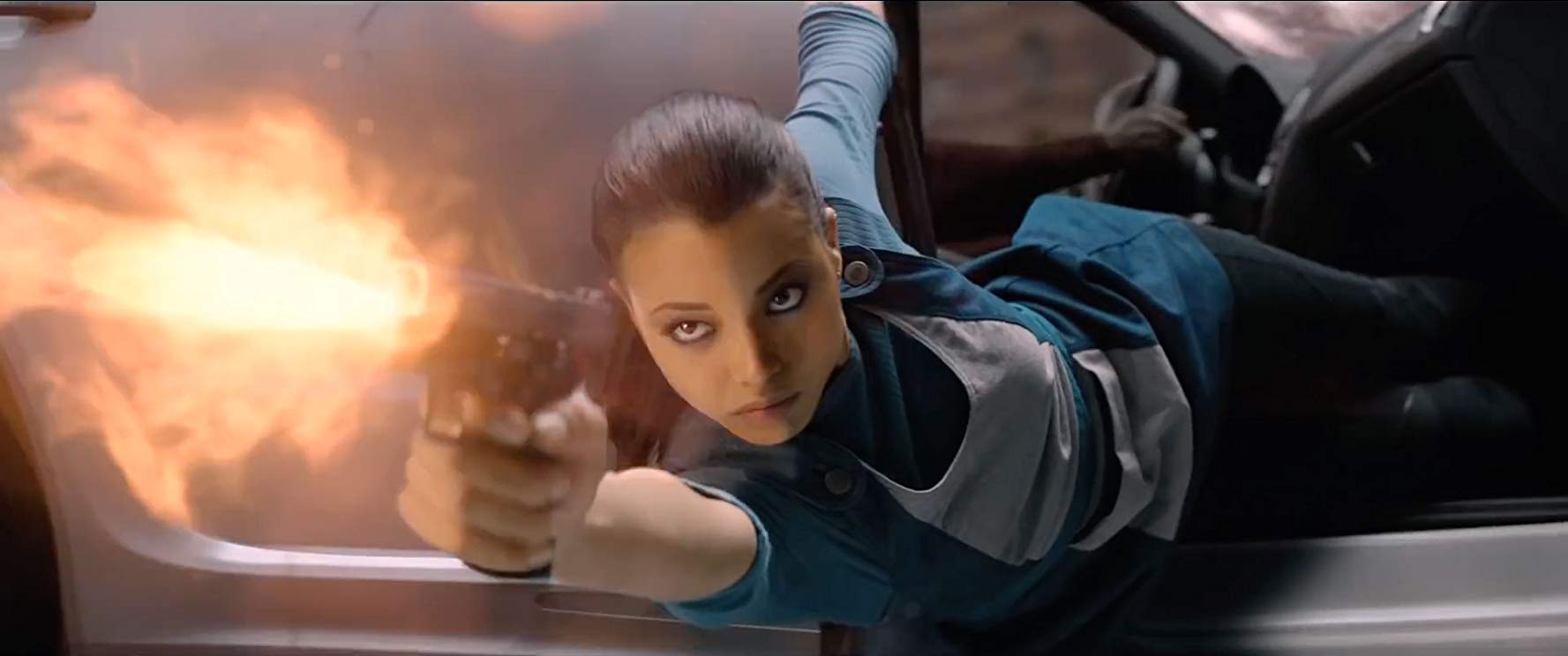★★
“Go woke, go broke”
 Back in 2000, Charlie’s Angels came out of more or less nowhere to become an unexpected popular hit. Sure, the TV series was well-known, but by that point it had been off the air for close to two decades. Its stars, Drew Barrymore, Cameron Diaz and Lucy Liu, were to that point known, if at all, for playing the love interest in romantic comedies like The Wedding Singer or There’s Something About Mary. But driven by a heady mix of self-awareness and top-quality kung-fu (choreographed by Yuen Wo-Ping, who has had a hand in many of the best genre films, from The Matrix to Crouching Tiger), it became the year’s 12th biggest hit at the US box-office.
Back in 2000, Charlie’s Angels came out of more or less nowhere to become an unexpected popular hit. Sure, the TV series was well-known, but by that point it had been off the air for close to two decades. Its stars, Drew Barrymore, Cameron Diaz and Lucy Liu, were to that point known, if at all, for playing the love interest in romantic comedies like The Wedding Singer or There’s Something About Mary. But driven by a heady mix of self-awareness and top-quality kung-fu (choreographed by Yuen Wo-Ping, who has had a hand in many of the best genre films, from The Matrix to Crouching Tiger), it became the year’s 12th biggest hit at the US box-office.
But even then, it gave the sense of having caught lightning in a bottle: I wrote “It works beautifully, despite its flaws, but it wouldn’t bear frequent repetition.” And so it proved in 2003. The lacklustre sequel, Full Throttle, came out, and we concluded, “There’s little point bothering with the new movie.” Few did. It lost 63% of its box-office in its second weekend, compared to 39% for its predecessor, and grossed less than Daddy Day Care, barely squeaking into the top thirty for the year. An attempt to return the franchise to its roots fared worse still in 2011. A televisual reboot was canceled after only four episodes had aired.
But still, the lure of recapturing the popular and critical success of the 2000 movie remained. Sony began working on a new version as long ago as September 2015, with Elizabeth Banks coming on board as writer-director. To her credit, she didn’t seem to be attempting to recapture the vibe of its successful predecessor, opting to go in a different direction. Unfortunately, the main difference is that the original film is one of the few action heroine films which I, my wife, plus our (then-teenage) son and daughter all unironically like. The path Banks instead chose managed to appeal to very few. Turns out, almost nobody wanted to sit through an action film which she proudly announced, was “loaded with sneaky feminist ideas.” This is my unsurprised face.
If you were paying attention, there were multiple other examples of the screwed-up priorities to be found in this production. “One of the statements this movie makes is that you should probably believe women,” said Banks in a pre-release interview. “We’re taking on the patriarchy”, proclaimed star Kristen Stewart at the premiere. And she demanded her character be gay, because “It was important for Kristen to present herself as queer in the movie and I was all for it,” according to Banks. It apparently comes as a shock to the makers, that most people don’t go to the movies for this kind of thing. I know I certainly don’t. This is especially true in today’s fractured society, where social media has become a battleground between extremes, leaving the rest of us tired and seeking to escape from all-pervasive dogmatic yelling. If a film has a message, that’s one thing. If a film is a message, it’s quite another.
And the very first line here is “I think women can do anything,” making it painfully obvious into which camp this version falls (and hardly counts as “sneaky”). Can you imagine Ellen Ripley, Imperator Furiosa or Alice coming out with that kind of fortune cookie/teen Disney nonsense? No. Because they are too busy being freakin’ awesome. They are action heroines after all, leading by example, not banal sloganeering. This is how effective messaging works in movies. Brave characters don’t win over the audience by just going around saying, “Anyone can be courageous.” Instead, they put their words into deeds, by doing brave things.

This concept is something which Banks’s Angels fail to understand. Instead, they set out their ‘woke’ stall inside five minutes with lines like, “Did you know that it takes men an additional seven seconds to perceive a woman as a threat compared to a man?” No, I did not. And nor do I care about this highly-dubious statement. Demonstrate you are a threat, then I’ll start paying attention. Otherwise, please make use of those seven seconds to go back in the kitchen and make me a damn sammich, babe. Not that Stewart, who delivers these lines, qualifies for the B-word, bearing a closer resemblance here to Justin Bieber after a three-day bender. The original film proved it was entirely possible for women to kick serious ass, while looking good doing it. Stewart manages to do neither, at one point apparently needing wire-work assistance to hop over a low fence. Very popular in the lesbian community though, I believe.
After an opening sequence featuring girls doing random stuff while grinning like they were on meth, because… [checks notes] Ah, yes: “sneaky feminist ideas,” it seemed there was no way back for this mess. Yet, I will say, that was likely the low-point. The rest recovered somewhat, albeit only to reach the low bar of mediocre Hollywood pap, applying a sheen of competent gloss to its poorly-conceived ideas. I guess that counts as a win, of sorts. If Stewart was thoroughly unimpressive, I did quite like Ella Balinska as co-Angel Jane Kano. She fares considerably better in the action area, particularly in her final fight against enemy assassin, Hodak. But that’s probably the only sequence which sticks at all in my mind, and even there, I’m writing this just 12 hours after finishing the film. I’m not sure I’ll be able to tell you much about it by this time next week. There’s nothing to match, say, the four-way brawl between the Angels and Crispin Glover, while Smack My Bitch Up blasted on the soundtrack. Heck, even the music here firmly puts the rap in crap.
 As the pic above shows, Jane does at least get to wield guns here, something Drew Barrymore almost entirely excised from her version (though I’d be hard pushed to say I missed them). It’s another small victory, in a film of generally staggering blandness. The plot, for instance, concerns some technological Macguffin, which can be used as a biological EMP weapon, and must be stopped – I’m dozing off as I type this – from falling into the hands of the bad guys. Emphasis on “guys” since, almost without exception, you can identify the villains by whether they stand up when they pee. I guess “men = treacherous perverts” is another one of those ‘sneaky feminist ideas’ on which the director was so woefully keen.
As the pic above shows, Jane does at least get to wield guns here, something Drew Barrymore almost entirely excised from her version (though I’d be hard pushed to say I missed them). It’s another small victory, in a film of generally staggering blandness. The plot, for instance, concerns some technological Macguffin, which can be used as a biological EMP weapon, and must be stopped – I’m dozing off as I type this – from falling into the hands of the bad guys. Emphasis on “guys” since, almost without exception, you can identify the villains by whether they stand up when they pee. I guess “men = treacherous perverts” is another one of those ‘sneaky feminist ideas’ on which the director was so woefully keen.
There’s no sense of escalation either, with pacing that’s poor. The film effectively ends a good thirty minutes before the credits roll, with a battle between the Angels and the villains in a rock quarry. It then limps on into a plot about a mole inside the organization, which feels entirely tacked on, because it doesn’t seem to have been any kind of real issue for the first hour and a half of the movie. It finishes with a lengthy training montage of Elena Houghlin (Scott), the computer wiz responsible for the Macguffin. We know she’s a wiz, because she says things like “All I need is root access.” She ends up getting recruited as an Angel, a good ninety minutes too late to provide any meaningful point for the character. The training sequence clearly just lets Banks get some of her pals into the film, to make cameo appearances.
It’s not often I want a film to flop, sight unseen. Even more rarely for an action heroine film. Still, I must confess, I was thoroughly gratified to hear the box-office speak, with a vengeance. In its entire nine week domestic run, Angels took just $17.8 million. That’s almost $10 million less than Full Throttle did… on its opening Friday and Saturday… at a time when the average ticket cost a third less than now. Ouch. So much for Banks’ statement: “If this movie doesn’t make money it reinforces a stereotype in Hollywood that men don’t go see women do action movies.” No, Lizzie. Men don’t go see women do bad action movies. And nor do women. For simply to shriek “Male chauvinism!” as a defense of the film doesn’t work, when it was named “Sequel or Remake That Shouldn’t Have Been Made” by the Alliance of Women Film Journalists, in their awards for 2019.
Coming on the heels of similarly “woke” flops like Terminator: Dark Fate, you wonder whether Hollywood might learn from their mistakes, and realize that they are employed by us for entertainment purposes, and not moral guidance. Unfortunately, I suspect that might require rather more self-awareness and humility than is usually to be found in Tinseltown.
Dir: Elizabeth Banks
Star: Kristen Stewart, Ella Balinska, Naomi Scott, Kristen Banks




